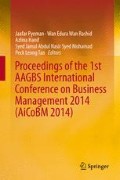Abstract
For about one decade now, the Generation Y has been entering the workforce in large numbers, which has given them the power to reshape the rules of play at work. Gen Y employees share many of the values of hard work and social consequences and demand more individual treatment and flexibility in training, work assignments, and work schedules. As the major test that faces organizations today is how to enhance job satisfaction within this new generation, this conceptual study aims to explore the work styles, professional expectations, and career concerns of Gen Y employees as the factors that could enhance their job satisfaction and to develop a preliminary job satisfaction model applicable to the Malaysian workforce. In-depth review of past literature was also made to further understand the elements that would lead to Gen Y more fulfilled at the workplace.
Access this chapter
Tax calculation will be finalised at checkout
Purchases are for personal use only
References
Broadbridge AM, Maxwell GA, Ogden SM (2007) Students’ views on retail employment – key findings from Generation Ys. Int J Retails Distrib Manag 35(12):982–992
Martin CA (2005) From high maintenance to high productivity. Ind Commer Train 37(1):39–44
Shaw S, Fairhurst D (2008) Engaging a new generation of graduates. Educ + Train 50(5):366–378
Meier J, Crocker M (2010) Generation Y in the workforce: managerial challenges. J Hum Res Adult Learn 6(1):68–78
De Han, Xikun Su (2011) Managing generation Y: recruiting and motivating. In: Management and Science Centre (MASC) international conference, 12–14 August 2011, Wuhan, China
Ng ESW, Schweitzer L, Lyons ST (2010) New generation, great expectations: a field study of the millennial generation. J Bus Psychol 25:218–292
Robert Half International (2008) Survey generation Y: a new generation in the workforce. Robert Half International, Menlo Park, CA
Wong M (2009) A Gen Y’s message to CEOs. The Edge, 8 June
Eisner SP (2005) Managing Generation Y. SAM Adv Manag J 70(4):4–15
Lewis KR (2003) Managing multiple generations in the workplace can be a challenge. New House Service. Retrieved from http://www.newhousenews.com
Tolbzie A (2008) Generational differences in the workplace. Res Train Cent Commun Living 19:1–13
Hewlett SA, Sherbin L, Sumberg K (2009) How Gen Y & Boomers will reshape your agenda. Harv Bus Rev Jul–Aug; 87(7–8):71–76
Weyland A (2011) Engagement and talent management of Gen Y. Ind Commer Train 43(7):439–445
Spector PE (1997) Job satisfaction: application, assessment, causes, and consequences. Sage, Thousand Oaks
Locke EA (1969) What is job satisfaction? Organ Behav Hum Perform 4:309–366
Luthans F (2002) The need for and meaning of positive organizational behaviour. J Organ Behav 23(6):695–706
Oshagbemi T (2000) Gender differences in the job satisfaction of university teachers. Women Manag Rev 15(7):331–343
Hatfield G (2002) Psychology, philosophy, and cognitive science: reflections on the history and philosophy of experimental psychology. Mind Lang 17(3):207–232
Hagedorn LS (2000) Conceptualizing faculty job satisfaction: components, theories, and outcomes. New Dir Inst Res 2000(105):5–20
Herzberg F (1966) One more time: how do you motivate employees? Harv Bus Rev 46(1):53–62
Kalleberg AL (1977) Work values and job rewards: a theory of job satisfaction. Am Sociol Rev 42(1):124–143
Volkwein JF, Malik SM, Prancl MN (1998) Administrative satisfaction and the regulatory climate at public universities. Res High Educ 39(1):43–63
Baruch Y (2004) Transforming careers: from linear to multidirectional career paths: organizational and individual perspectives. Career Dev Int 9(1):58–73
Arnold J (1997) The new career: issues and challenges. Br J Guid Couns 25(4):427–433
Kerslake P (2005) Words from the Ys. New Zealand Manage 52(4):44–46
Teh YY (2011) An analysis on workplace expectations among the white collar employees across Baby Boomers, Gen X and Gen Y in Malaysia. Paper presented at 2011 conference on interdisciplinary business and economics research, Bangkok, Thailand, 16–18 June
Arthur MB (1994) The boundaryless career: a new perspective for organizational inquiry. J Organ Behav 15(4):295–306
Hall DT, Mirvis PH (1996) The new protean career: psychological success and the path with a heart. In: DT Hall, Associates (eds) The career is dead: long live the career. Jossey Bass, San Francisco, pp 15–45
Beutell NJ, Wittig-Berman U (2008) Work-family conflict and work-family synergy for generation X, baby boomers, and matures: generational differences, predictors, and satisfaction outcomes. J Manag Psychol 23(5):507–523
Bellou V (2010) Organizational culture as a predictor of job satisfaction: the role of gender and age. Career Dev Int 15(1):4–19
Ghazzawi E (2011) Does age matter in job satisfaction? The case of US information technology professionals. J Organ Cult Confl 15(1):25–54
Spiro C (2006) Generation Y in the workplace. Defense AT&L, November–December 2006, pp 16–19
Kowske BJ, Rasch R, Wiley J (2010) Millennials’ (lack of) attitude problem: an empirical examination of generational effects on work attitudes. J Bus Psychol 25:265–279
Yeaton K (2008) Recruiting and managing the why?’Generation: Gen Y. CPA J 78:68–72
Acknowledgment
The authors would like to thank Research Management Institute (RMI) of Universiti Teknologi MARA (UiTM), Malaysia, for giving the support and funding to conduct this study. RIF No.: 600-RMI-DANA 5/3/RIF (865/2012).
Author information
Authors and Affiliations
Corresponding author
Editor information
Editors and Affiliations
Rights and permissions
Copyright information
© 2016 Springer Science+Business Media Singapore
About this paper
Cite this paper
Sharkawi, S., Kayani, A.J., Zayadah, M.A. (2016). Generation Y and Job Satisfaction: Work Styles, Professional Expectations, and Career Concerns. In: Pyeman, J., Wan Rashid, W., Hanif, A., Syed Mohamad, S., Tan, P. (eds) Proceedings of the 1st AAGBS International Conference on Business Management 2014 (AiCoBM 2014). Springer, Singapore. https://doi.org/10.1007/978-981-287-426-9_17
Download citation
DOI: https://doi.org/10.1007/978-981-287-426-9_17
Publisher Name: Springer, Singapore
Print ISBN: 978-981-287-425-2
Online ISBN: 978-981-287-426-9
eBook Packages: Business and ManagementBusiness and Management (R0)

